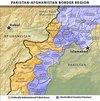The Taliban have executed their fourth major suicide attack in Pakistan in the past week. The latest attack occurred today in the settled district of Kohat. More than 40 Pakistanis were killed and 40 wounded when a suicide bomber detonated his vest during a tribal meeting in the town of Zargoan in Kohat.
The tribal jirga, or meeting, was attended by over 1,500 members of five local tribes. The meeting “was convened to [analyze] the security situation in troubled Darra Adam Khel and suggest ways and means to flush out militants” from Kohat, the Associated Press of Pakistan, the government’s news organization, reported. The suicide bomber struck as the tribal leaders were leaving the meeting in an attempt to take out the tribal leadership. “Most of the victims were local tribesmen and tribal elders,” APP reported. At least one tribal leader and the father of a Pakistani senator were killed.
Kohat and the neighboring Orakzai tribal agency have been the scenes of recent fighting between the Pakistani security forces and the Taliban. The Taliban hijacked a military convoy in Darra Adam Khel and seized weapons destined for the military operation in South Waziristan in late January. Clashes ensued as the Pakistani military moved forces into the region to battle the Taliban, but the military quickly formed a “peace jirga” to negotiate with the Taliban.
The Taliban responded by taking over the strategic Kohat Tunnel, a vital link on the Indus Highway that connects Peshawar to the southern tribal agencies and settled districts. The Taliban kidnapped more than 50 paramilitary troops from the Frontier Corps during the fighting at the Kohat Tunnel; several were beheaded and mutilated. The government retook the Kohat Tunnel after days of fierce fighting. The Taliban damaged the tunnel and attempted to destroy it.
Today’s suicide attack follows three major attacks inside Pakistan over the past week. A suicide bomber attacked a vehicle of the Bajaur Levies on March 1. Two paramilitary soldiers were killed and 24 were wounded. A suicide bomber struck at a policeman’s funeral in the settled district of Lakki Marwat on Feb. 29. More than 40 Pakistanis were killed and scores more were wounded, many of them critically.
On Feb. 25, a suicide bomber killed the Pakistani Army’s surgeon general in the military garrison city of Rawalpindi. Seven others were killed in the attack and 20 were wounded after a Taliban suicide bomber rammed into Lieutenant General Mushtaq Ahmed Baig’s staff car. Mushtaq is the senior-most general killed in Pakistan since Sept. 11, 2001.
The Taliban has conducted a vicious suicide bombing campaign against military and civilian targets in the tribal agencies, the Northwest Frontier Province, and greater Pakistan since the signing of the 2006 North Waziristan Accord. The Pakistani government has responded by conducting limited military offensives that have ended with cease-fires, truces, or new peace agreements. The Pakistani government has openly negotiated deals with the Taliban in North and South Waziristan, Swat, Bajuar, and Mohmand.
See The Fall of Northwestern Pakistan for the full timeline on the rise of al Qaeda and the Taliban in the tribal agencies, the Northwest Frontier Province, and greater Pakistan.









4 Comments
Chaper Khel, Akwarwall, Zargoonkhel, Toor Chapper and Bosi Khel have been insulted.
They ain’t got a hair on their asses if they don’t raise lashkars to avenge this insult to their honor.
Some snake-eatin’, knuckle-draggin’, Pashto-fluent anthropologists should be explaining to them their obligations under Pashtunwali. Some suitcases full of St. George’s Cavalry slipped to the right malik wouldn’t be a bad idea, either.
This is a phenomally good translation, and other Afghan news – updated
I used to be, by dint of severe shortages, an English-Czech translator in Prague for the politician who is now President of the Czech Republic, Vaclav Klaus. I only heard one thing I would wish to change in the translation that accompanies this vid…
Do bombings like this help or hurt the Taliban? I can’t help but think they have created more enemies than they have killed. The Taliban is increasingly fighting other Pashtoons instead of handing Pakistani army more embarrassments.
At this point the Taliban may have more men under arms and more preparation than any time since the fall of Afghanistan. On the flip side of the coin though, there is much more resistance in the general populous than there was just six months ago. Plus, this resistance is reaching well into the Pashtoon population. While last year the Taliban was moving into new areas with acceptance or at least passivity of the population, the populous seems much more unwilling to join up with the Taliban’s cause.
Of equal significance is the growing realization among much of the Pashtoon population that this struggle is not a Pashtoon nationalist cause. This is an outsider cause, a proxy war promoted and funded by radicalized Arabs.
It is much too early to say whether things are unraveling for the Taliban, but much like the situation in Iraq the local populous is finding Al Qaeda/The Taliban to be toxic. They’ve squandered many opportunities and antagonized potential allies and now they find themselves where they must coerce and intimidate where they may once have had willing allies.
The Thunder Run has linked to this post in the – Web Reconnaissance for 03/03/2008 A short recon of what’s out there that might draw your attention, updated throughout the day…so check back often.